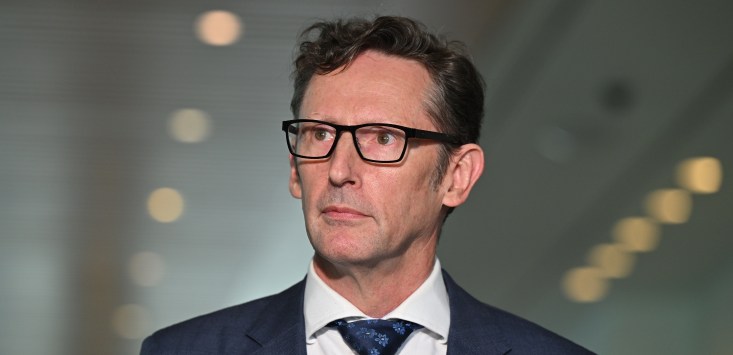
Assistant Treasurer and Minister for Financial Services Stephen Jones. Source: AAP Image/ Mick Tsikas
It seems Australia may finally get some long-awaited crypto exchange regulation, with Assistant Treasurer Stephen Jones pegged to announce the federal government’s plans on Monday.
The unveiling of the new regulations will be at the Australian Financial Review‘s (AFR) Crypto Summit. It will reportedly come under pre-existing financial services laws and will be done so at an exchange level.
According to the AFR, any cryptocurrency exchanges operating in Australia with more than $5 million in aggregate — or over $1,500 per user — will be required to have an Australian Financial Services Licence (AFSL).
This will beholden exchanges to the same rules as traditional AFSL holders, including disclosures, solvency and cash reserve needs, submission of financial accounts and management of conflicts of interest.
However, crypto exchanges will also be subject to additional rules due the unique nature of digital tokens. This will include standard form contracts as well as standards for the holding and transaction of tokens and custody software.
ASIC chairman Joe Longo will also reportedly be addressing regulation at the AFR‘s Summit today.
“We shouldn’t think crypto is somehow outside traditional standards. Offering services that involve new and innovative technologies, or that are built around new and innovative technologies, doesn’t afford service providers a regulatory exemption,” Longo will say during his speech.
“Crypto must be held accountable to the same high standards we expect of everyone else … Whatever regulatory model the government decides is appropriate, ASIC needs access to the same – or similar – tools as we have for other products and related services.”
It should be noted that there are no plans, at this stage, for the federal government to regulate non-fungible tokens (NFTs) for video games or in the art world. That being said, exchanges that trade NFTs will still need to have an AFSL.
Considering the fact that scams are one of the main reasons spruiked by the government in favour of regulation, it’s interesting to see it ignoring NFTs and their marketplaces right now.
Why regulate crypto?
The purpose of regulating cryptocurrency exchanges is to mitigate scams, as well as the current risks posed by collapses — such as the FTX collapse in 2022. The founder and CEO of FTX, Sam Bankman-Fried, is currently on trial in the Southern District of New York for alleged fraud and conspiracy
The collapse of FTX occurred after users rushed to pull cash out of the exchange, but it couldn’t meet the withdrawls. FTX filed for bankruptcy in the US and went into administration in Australia. ASIC has also suspended its licence.
This all happened off the back of Binance backflipping on its announced acquisition of the company, liquidity issues and suspicious transactions in the company’s final hours. Customers discovered their accounts had been frozen after US$10 billion of customer money had been transferred out of the platform to be leveraged on another.
In December 2022, Bankman-Fried was arrested in the Bahamas and extradited to the US.
In addition to sending a ripple effect through the cryptocurrency space — with many companies and individuals left exposed — it served as a reminder about the lack of regulations in Australia to protect investors.
We even saw this in our own backyard when ASIC went after cryptocurrency platforms for offering what the watchdog alleges were unlicensed financial services products — Block Earner and Finder Earn. Swyftx shortly following suit by voluntarily closing down a similar product across the Christmas long weekend in 2o22.
Crypto exchange regulation in Australia has been a long time coming
A few months before the FTX scandal, Labor announced its own token mapping program through the Treasury to “help identify how crypto assets and related services should be regulated”.
But again, things went quiet.
In May, we reported there wasn’t a single mention of ‘cryptocurrency’ or ‘blockchain’ in any of the federal budget papers. Despite repeated attempts to find out why from the Treasury, the department failed to answer our questions.
Last month, the Senate Economics Legislation Committee rejected Senator Andrew Bragg’s proposed cryptocurrency regulation bill. At the time, the Senate Committee said the bill lacked specifics and appeared to be misaligned with the current government’s stance on digital assets.
It went on to state that the proposal didn’t resonate with global standards and could potentially raise regulatory discrepancies.
And now we perhaps know why, because Treasury is finally releasing its own proposal. And according to the government, it wants to leave room for blockchain innovation in the fintech space.
According to Treasury, its new regulations will be “designed to accommodate a future where an increasing number and variety of products are tokenised”.
Handpicked for you

Crypto regulation bill rejected, Labor’s token mapping plan still MIA



COMMENTS
SmartCompany is committed to hosting lively discussions. Help us keep the conversation useful, interesting and welcoming. We aim to publish comments quickly in the interest of promoting robust conversation, but we’re a small team and we deploy filters to protect against legal risk. Occasionally your comment may be held up while it is being reviewed, but we’re working as fast as we can to keep the conversation rolling.
The SmartCompany comment section is members-only content. Please subscribe to leave a comment.
The SmartCompany comment section is members-only content. Please login to leave a comment.